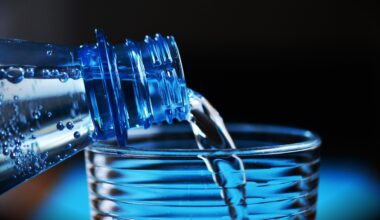Understanding Body Composition and Nutrition for Swimmers
Swimming is a demanding sport that requires an optimal balance of various nutritional elements to support the athlete’s performance. Understanding body composition is crucial for swimmers to ensure they can achieve their best results in the water. Proper nutrition plays a vital role in enhancing energy levels, recovery times, and overall performance. Swimmers need to focus on macronutrients, such as carbohydrates, proteins, and fats, as well as micronutrients, to fuel their workouts effectively. A well-rounded diet helps maintain muscle mass while providing the necessary energy for prolonged training sessions. Swimmers should also consider hydration, as even minor dehydration can significantly impair performance. An effective nutrition plan tailored to individual training demands can enhance muscle repair and growth, ultimately leading to better efficiency and speed in the pool. Additionally, understanding the phases of training can help swimmers adjust their diet to meet the changing needs throughout their training cycles. By focusing on these aspects of swimming nutrition, athletes can create a foundation that supports their health and performance goals.
Body composition is a measurement referring to the various components that make up a body, primarily fat mass and lean mass. For swimmers, having the right body composition can facilitate improved buoyancy and streamlined movement through the water. Most successful swimmers possess a low body fat percentage and a high muscle mass proportion. To achieve and maintain this ideal body composition, swimmers should incorporate strength training and cardiovascular exercises into their routine. Additionally, they should consume a nutrient-dense diet that emphasizes lean proteins, whole grains, fruits, and vegetables. Essential fats, particularly omega-3 fatty acids, can aid in reducing inflammation and supporting joint health. It is also important for swimmers to track their body composition regularly using methods such as skinfold measurements or bioelectrical impedance analysis to monitor progress. Nutritionists often recommend having clear goals related to body composition to tailor a nutrition plan specifically suited to achieve those objectives. Proper guidance ensures that performance remains optimal while avoiding detrimental weight management practices. Adopting a healthy lifestyle paired with smart nutritional choices enhances a swimmer’s overall potential.
Carbohydrate Importance for Swimmers
Carbohydrates serve as a primary source of energy for swimmers, making them an essential component of a swimmer’s diet. These macronutrients are particularly crucial during high-intensity workouts and competitions, where energy demands increase significantly. Simple carbohydrates, like fruits and honey, provide quick bursts of energy, while complex carbohydrates, such as oatmeal and whole-grain pasta, offer sustained energy release for longer training sessions. Swimmers should consume carbohydrates before, during, and after practice to optimize their performance and recovery. A common strategy is to have a carbohydrate-rich meal or snack approximately two to three hours before training. During prolonged training or competitions, consuming easy-to-digest carbohydrates, like sports drinks or energy gels, can help maintain energy levels. Post-training, the body needs to replenish glycogen stores, which can be achieved effectively with carbohydrates consumed alongside protein. Balancing carbohydrate intake with exercise intensity can lead to improved performance. Supporting fat utilization while promoting glycogen reserves is pivotal for athletes seeking peak performance in the water.
Beyond carbohydrates, protein plays a crucial role in the diets of swimmers, particularly regarding muscle repair and growth. After intense swim sessions, swimmers’ muscles endure stress, and protein is essential for the recovery process. Aim for an adequate intake post-workout to promote muscle protein synthesis. High-quality protein sources, like chicken, turkey, fish, and plant-based options like legumes and quinoa, should be included. It is advisable to consume protein as part of each meal and snack throughout the day, providing a steady supply to the body for recovery. Dietary recommendations typically suggest approximately 1.2 to 2.0 grams of protein per kilogram of body weight for athletes, depending on their training intensity and individual objectives. Swimmers can benefit from incorporating protein-rich snacks, such as yogurt or nuts, into their diets to meet their daily requirements. Focusing on nutrient timing can also enhance recovery and support performance. Recognizing the right balance of carbohydrates and protein helps swimmers fully harness their training benefits, leading to improved results in competitions.
The Role of Fats in Swimming Nutrition
While carbohydrates and proteins are often highlighted, healthy fats are also crucial in a swimmer’s nutrition plan. These macronutrients are vital for hormone production, nutrient absorption, and providing energy, particularly during lower-intensity activities. Swimmers should prioritize healthy fats found in sources such as avocados, nuts, seeds, and fish. These foods can provide necessary fatty acids, which support overall health, reduce inflammation, and assist in recovery. Including sources of omega-3 fatty acids, in particular, can enhance joint health, a significant consideration for swimmers enduring rigorous training schedules. It is important to approach fat intake wisely; however, as excessive consumption can lead to weight gain and hinder performance. A balanced diet should include approximately 20-35% of total daily calories from fat. Timing your intake of fats is also important, as consuming them before a workout could slow digestion. For optimal performance and recovery, ensure fats are included in proportionate amounts alongside other macronutrients to cater to the unique energy demands of swimming.
Hydration is an often overlooked yet crucial aspect of swimming nutrition. Proper hydration aids in maintaining performance levels, regulating body temperature, and preventing fatigue during long swim sessions. Swimmers should develop a consistent hydration strategy, which includes drinking adequate fluids before, during, and after training. The amount of fluid required varies based on multiple factors, including temperature, humidity, and individual sweat rates. Electrolytes, like sodium and potassium, are also vital when considering hydration, helping to maintain fluid balance in the body. Utilizing drinks enriched with electrolytes can be beneficial during extended workouts or competitive events. The general recommendation is to consume half of one’s body weight in ounces of water daily, and this may increase with the intensity of training. Swimmers are encouraged to carry a water bottle during practice to foster regular hydration habits. Monitoring the color of urine can also serve as a hydration guide; pale yellow generally indicates good hydration. Ensuring fluid needs are met can significantly enhance endurance and overall performance in swimming.
Nutritional Timing for Optimal Performance
Nutritional timing is a strategy athletes, including swimmers, can use to enhance performance and recovery through the intentional timing of nutrient intake around training sessions. This concept revolves around the idea that consuming the right nutrients before, during, and after workouts can optimize energy levels and speed recovery. Pre-workout, swimmers should focus on a meal rich in carbohydrates and moderate protein for sustained energy. Recommended timing is around two to three hours before training. During competitions or longer sessions, quick-digesting carbohydrates help to maintain energy levels. Post-workout, it is essential to replenish glycogen stores with a combination of carbohydrates and protein, ideally within 30 minutes after swimming. This approach supports muscle repair and reduces soreness, enabling athletes to train effectively the following day. Overall, adopting a personalized nutritional timing strategy can give swimmers a competitive advantage, ensuring they maintain energy, enhance recovery, and consistently perform at their best in the water.
In conclusion, understanding body composition and nutrition is fundamental for swimmers aiming to achieve optimal performance. By prioritizing the right balance of macronutrients, paying attention to hydration, and implementing nutritional timing strategies, swimmers can significantly enhance their training results. The incorporation of adequate carbohydrates, proteins, and healthy fats into their diets, along with personalized nutrition plans, can provide the energy and support needed to excel in this demanding sport. Furthermore, monitoring body composition will help swimmers maintain their desired physique while effectively fueling their bodies for optimal performance. It is crucial for swimmers to consult with nutrition experts to tailor their diets to their individual needs. With informed choices regarding nutrition, they can maximize their potential in swimming competitions while also ensuring long-term health and well-being. By adopting a holistic approach to swimming nutrition and focusing on body composition, athletes can achieve their goals and elevate their performance in the water. As they strive for success, education and dedication to diet will be indispensable tools on their journey to greatness.


